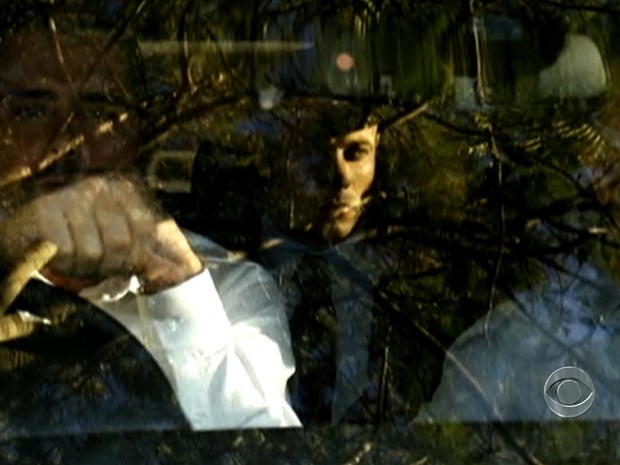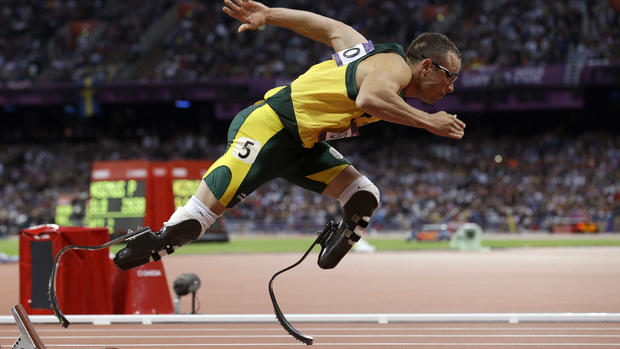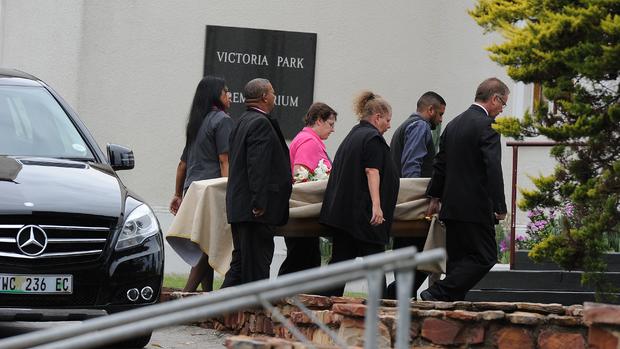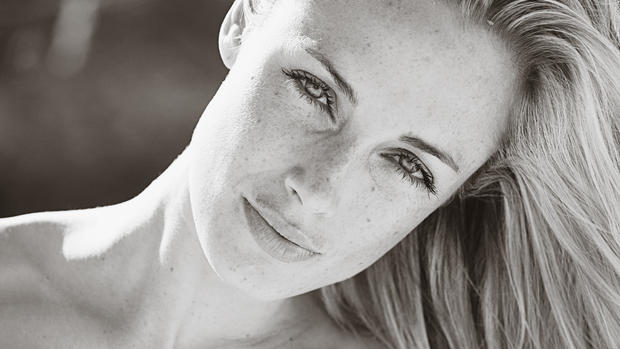Oscar Pistorius freed on bail in murder case
Updated at 7:43 p.m. ET
PRETORIA, South Africa Oscar Pistorius walked out of a South African court Friday a free man -- for now -- after a magistrate agreed to release him on bail ahead of his premeditated murder trial over the shooting death of his girlfriend.
But even as he was driven away from court and chased by videographers and photographers, questions continued to hound the Paralympian about what actually happened when he opened fire on Valentine's Day inside his home and killed Reeva Steenkamp.
Chief Magistrate Desmond Nair, who agreed to bail with harsh restrictions for the athlete, expressed his own doubts about Pistorius' story. Those questions, highlighted at a four-day bail hearing that at times foreshadowed his coming trial, come from Pistorius' account that he felt threatened and mistook Steenkamp for an intruder when he fired the four shots at her in his bathroom.
"Why would (Pistorius) venture further into danger?" Nair asked.
The magistrate also said that Pistorius' affidavit, in which he gave his detailed version of the events of the shooting in a sworn statement, had helped his application for bail. He compared it to other defendants' "flimsy" affidavits in which they merely deny the charges against them.
"That reaching out in the affidavit, the way that he did, placing it before the court," Nair said. "I come to the conclusion that the accused has made a case to be released on bail."
Pistorius' supporters shouted "Yes!" when Nair made his decision after the nearly two-hour explanation of his ruling to a packed courtroom in Pretoria, South Africa's capital. Yet when prosecutors and the defense said they agreed to bail terms, Nair more than doubled those conditions for the 26-year-old runner to be free ahead of trial.
Nair set the bail at 1 million rand ($113,000), with $11,300 in cash up front and proof that the rest is available. The magistrate said Pistorius must hand over his passports and also turn in any other guns that he owns. Pistorius also cannot leave the district of Pretoria without the permission of his probation officer, Nair said, nor can he take drugs or drink alcohol.
Pistorius' family members hugged each other after the decision was read, with tears in their eyes.
"We are relieved at the fact that Oscar got bail today but at the same time we are in mourning for the death of Reeva with her family," said Pistorius' uncle, Arnold Pistorius. "As a family, we know Oscar's version of what happened on that tragic night and we know that that is the truth and that will prevail in the coming court case."
Sharon Steenkamp, Reeva's cousin, had said earlier that the family wouldn't be watching the bail decision and hadn't been following the hearing in Pretoria.
"It doesn't make any difference to the fact that we are without Reeva," she told The Associated Press.
Reeva Steenkamp was Gina Myers' best friend and house mate. Reeva's bedroom now lies empty - just as she left it the night she died. "I do go through all a lot of stages of disbelief," she told CBS News, "because it doesn't feel real. This is a very, very weird sensation."
Nair set Pistorius' next court appearance for June 4. The Olympian left the courthouse in a silver Land Rover, sitting in the rear, just more than an hour after the magistrate imposed the bail conditions. The vehicle, tailed by motorcycles carrying television cameramen aboard, later pulled into the home of Pistorius' uncle.
Pistorius left behind more than a dozen international and local television crews at the red-brick courthouse. It's a sign of the growing global fascination with a case involving an inspirational athlete and his beautiful, law-school graduate girlfriend, who was a model and reality TV show contestant.
During Friday's long session in Pretoria Magistrate's Court, Pistorius alternately wept and appeared solemn and more composed, especially toward the end as Nair criticized police procedures in the case and as a judgment in Pistorius' favor appeared imminent. He showed no reaction as he was granted bail.
- Pistorius loses Nike deal, at least for now
- AP: Pistorius sought more guns before shooting
- Pistorius prosecution: Error in "testosterone" testimony
Before the hearing, Pistorius' longtime coach Ampie Louw said he hoped to put his runner back into his morning and afternoon training routine if he got bail.
"The sooner he can start working the better," said Louw, who was the person who convinced the double-amputee to take up track as a teenager a decade ago. But he acknowledged Pistorius could be "heartbroken" and unwilling to immediately pull on his carbon-fiber running blades, the reason behind his "Blade Runner" nickname.
There is one place, however, where Nair ordered that Pistorius cannot go: His upscale home in a gated community in the eastern suburbs of Pretoria, where he killed Steenkamp in the predawn hours of Feb. 14.
Pistorius said in a sworn statement to the court that he shot his girlfriend accidentally, believing she was an intruder in his house. He described "a sense of terror rushing over" him and feeling vulnerable because he stood only on his stumps before opening fire.
Prosecutors, however, say he intended to kill Steenkamp, saying the shooting followed a loud argument between the two. Yet despite poking holes in Pistorius' statement -- they questioned why he didn't notice his girlfriend missing despite walking past the bed and brought up incidents that they said highlighted his temper -- their case unraveled through testimony by the police's lead investigator in the case, Detective Warrant Officer Hilton Botha.
Botha, who faces seven charges of attempted murder in an unrelated incident, was removed from the case Thursday. His replacement, the nation's top detective, Vinesh Moonoo, stopped briefly by the hearing Friday. Prosecution spokesman Medupe Simasiku said later Friday: "We're still confident in our case."
While Nair leveled harsh criticism at Botha for "errors" and "blunders," he said one man does not represent an investigation and that the state could not be expected to put all "the pieces of the puzzle" together in such a short time. The magistrate questioned whether Pistorius would be a flight risk and be prepared to go "ducking and diving" around the world when he stood to lose a fortune in cash, cars, property and other assets.
Pistorius faced the sternest bail requirements in South Africa because of the seriousness of the charge. His defense lawyers had to prove that he would not flee the country, would not interfere with witnesses or the case and his release would not cause public unrest. They also had to show "exceptional" circumstances for his release as well, something Nair said could be found in the "weak" case offered by prosecutors.
Yet the magistrate still anticipated the shape of the state's case at trial. Nair said he had serious questions about Pistorius' account: Why didn't he try to locate his girlfriend on fearing an intruder was in the house? Why didn't he try to determine who was in the bathroom? And why would he venture into perceived "danger" -- the bathroom area -- when he could have taken other steps to ensure his safety?
Touching those unanswered questions, Nair said: "There are improbabilities which need to be explored."
As CBS News correspondent Emma Hurd reported, the drama of the bail hearing has set the stage for a gripping trial. Sources on both sides of the case have told CBS News that there is plenty of evidence that hasn't been revealed yet. Phone records and cell phone text messages will be key to establishing what happened that night.



